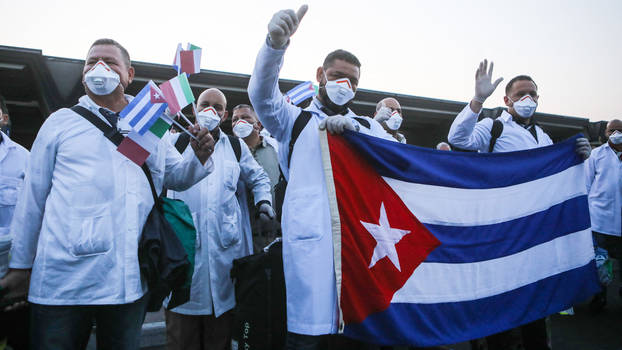
This Sunday, 22 March, a Cuban medical brigade made up of 52 health professionals arrived at the Milan airport amidst rounds of applause to support the Italian health system that has collapsed in its battle against COVID-19. Through this action, the Cuban people and its government demonstrate to the world a solidarity-based consciousness that only a socialist regime could have constructed. Actions of this kind, emerging from an internationalist left-wing stance rather than from neoliberal capitalism, allow the pandemic to be faced in the best way possible.
Patricia Zapata works as a project coordinator in the RLS Regional Office for Mexico, Central America, and Cuba.
From this “Third World” island, medical contingents embarked upon helping the whole world. From this island that struggles to survive amidst multiple limitations and besieged by an imperialist economic blockade, humane solidarity-based acts emerge. In addition, Cuba is today attempting to carry out economic reform without disowning socialism that may place it in an optimum position to successfully face the new global situation.
Cuba is thus showing old Europe and various governments what their priorities should be, demonstrating the results of the huge investment in healthcare during the revolutionary period. In order to fully understand this point, in Cuba healthcare services assist 99.2 percent of the population. There is one doctor for every 170 inhabitants and one nurse for every 126. These conditions today place Cuba in a privileged position to assist and provide close follow-up of this pandemic. Besides, the island has developed an antiviral medication called Interferon Alpha 2B, which they recommended to China in order to help treat the coronavirus—and it was successful.
Cuba did not construct its healthcare system only for its people: in 1999, Fidel Castro inaugurated the Latin American School of Medicine (Escuela Latinoamericana de Medicina), from which 29,600 doctors from more than 100 countries had graduated by July 2019. These doctors, once they return to their place of origin, provide healthcare services and medical care to populations that would otherwise be excluded from this possibility.
The large number of graduated doctors is also used as an input for economic resources. The Cuban government uses them to build international working agreements to send health professionals to countries that need them, resulting in incomes for the travellers but also for the country.
It is not the first time that the Cuban health sector has provided international support. For several years, it has been developing long-term cooperation programs. Two programs were launched in 2005:
-Operación Milagro (which could be translated into English as “Operation Miracle”), a sanitary initiative to address ocular pathologies, promoted by Cuba and Venezuela during the presidency of Hugo Chávez, as part of the programmes of the Bolivarian Alliance for the Peoples of Our America (Alianza Bolivariana para los Pueblos de Nuestra América, ALBA) and has so far provided free-of-charge assistance to four million people with minimal resources in 34 countries;
-The Henry Reeve Brigade (formally known as the International Contingent of Doctors Specializing in Disasters and Serious Epidemics), which in 2007 was granted an award by the World Health Organization after assisting more than 3.5 million people in 21 countries.
In addition, since 1990, the assistance provided in the paediatric clinic located on Tarará beach to 25,000 children affected by the Chernobyl catastrophe should also be remembered.
These facts are far from being the only ones that demonstrate to the world the way the Cuban people and government value solidarity. Suffice it to mention that within the framework of this same pandemic, Cuba welcomed over 1,600 passengers on the British cruise ship MS Braemar, stranded in the Caribbean and prohibited from reaching any other country. Cuba allowed the passengers to disembark onto its territory and set up a controlled sanitary ring so that they could eventually return to their destinations in better condition.
All these actions are carried out by a small island that faces the onslaught of the US blockade on a daily basis. Cuba cannot receive fuel, gas, raw materials to produce medical supplies, foodstuffs, or hygiene products because ships transporting these commodities do not reach Cuban ports, fearing that the US government will impose exorbitant fines on them.
Perhaps this crisis and the response received from different countries may highlight the fact that survival alternatives will not be generated by the neoliberal capitalist system. For decades, this system has been dismantling basic rights and material conditions. French President Emmanuel Macron was obliged to recognize that this pandemic has vindicated the need to maintain the European welfare state still surviving in some countries, since services such as healthcare should be beyond the control the laws of the marketplace.
This political island, isolated by the mass media and economically choked by the United States and countries that submit to its political line, has once again been congruent with socialist internationalism. The fraternity of peoples and individuals of the world must prevail over individualist and nationalist egotism.